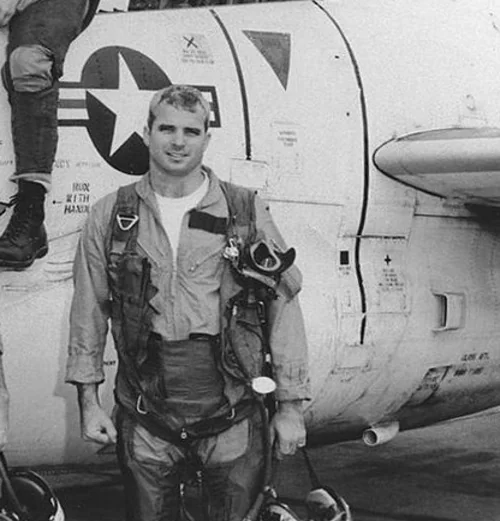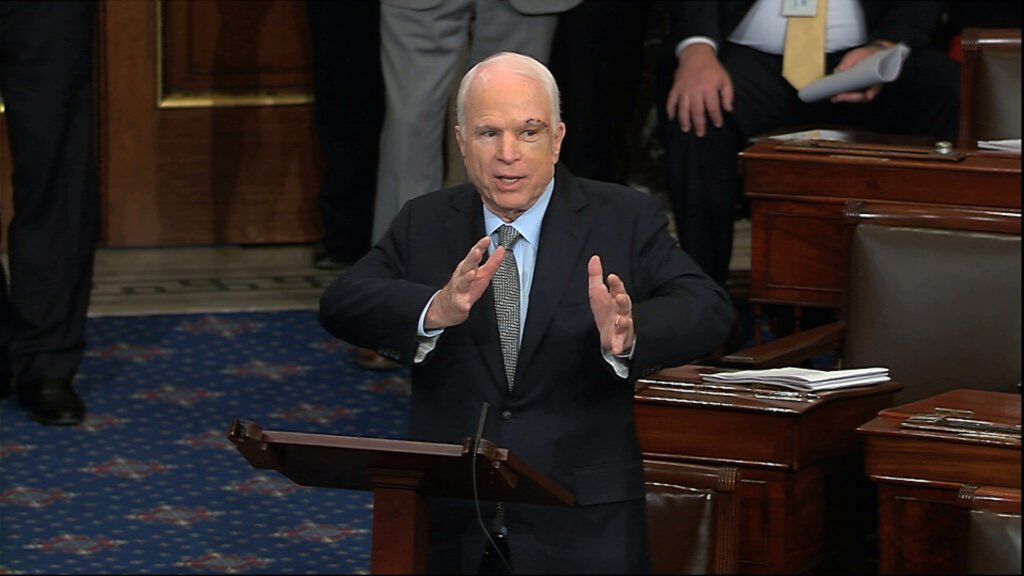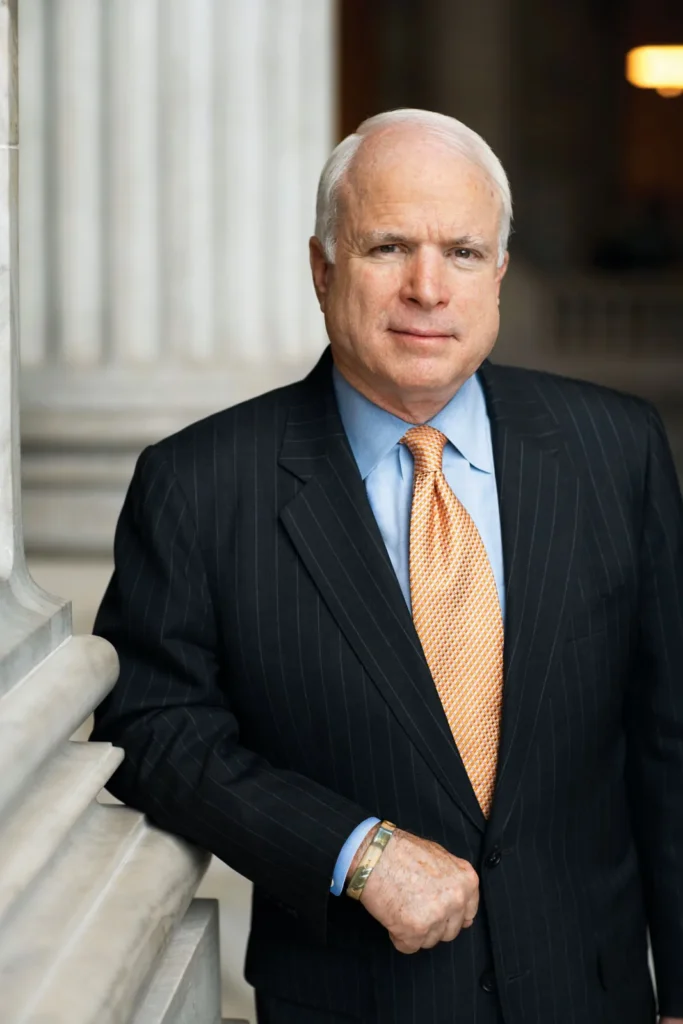John McCain Then and Now
John McCain Then
John McCain was born on August 29, 1936, at Coco Solo Naval Air Station in the Panama Canal Zone, into a family with deep military roots.
His father, a naval officer, was stationed there, and McCain spent his early years in a dynamic military environment.
Raised alongside two siblings, he experienced a childhood marked by frequent relocations due to his father’s service.
This nomadic lifestyle was a hallmark of military families, as his father and grandfather both ascended to the rank of four-star admirals in the Navy.
Growing up in such an environment instilled in McCain a profound sense of duty and commitment to public service, setting the stage for his later military and political career.
The McCains eventually settled in Northern Virginia in 1951, allowing John to experience a sense of stability and continuity during his formative years.
This period was significant for him, as he attended a private preparatory boarding school, where he excelled academically and athletically.

Notably, he became an accomplished wrestler, developing discipline and resilience that would serve him well throughout his life.
The combination of rigorous academics and competitive sports helped shape McCain’s character, reinforcing the values of hard work, perseverance, and leadership that he would carry into adulthood.
After graduating from high school, McCain followed in the footsteps of his illustrious family by enrolling at the United States Naval Academy.
There, he continued to cultivate his leadership skills and earned a reputation among his peers.
Related Article: Maxine Waters Then and Now
His time at the Naval Academy was not without challenges; despite graduating near the bottom of his class—with a rank of 894 out of 899—he distinguished himself as a lightweight boxer.
This experience demonstrated McCain’s tenacity and determination, qualities that would define his later endeavors, both in military service and in his long political career.
Ultimately, his early life experiences laid the foundation for a lifelong commitment to serving his country, embodying the ideals of sacrifice and leadership that his family had long upheld.
Related Article: Ron Johnson Then and Now
John McCain’s Political Career
John McCain’s political career began in earnest when he relocated to Arizona and was elected to the House of Representatives in 1982.
After serving two terms, he transitioned to the U.S. Senate, winning the election in 1986.
McCain quickly made a name for himself in the Senate, gaining national visibility with a well-received address at the Republican National Convention in 1988.
However, his career was not without controversy. He became embroiled in the savings and loan scandal of the 1980s due to his connections with Charles Keating Jr., the head of Lincoln Savings and Loan Association, who was found guilty of fraud.
Related Article: Bill de Blasio Then and Now
Although the Senate ultimately cleared McCain of any illegal activity, he received a rebuke for poor judgment, which prompted him to become a vocal advocate for campaign finance reform.
This advocacy culminated in the passage of the McCain-Feingold Bipartisan Campaign Reform Act in 2002, a significant legislative achievement aimed at regulating the influence of money in politics.
Throughout his Senate career, McCain maintained a generally conservative stance on issues such as military spending and labor legislation, aligning himself with the Republican mainstream.
However, he also distinguished himself by taking stands that diverged from conventional party lines.
Related Article: Marjorie Taylor Greene Then and Now

Notably, he supported the restoration of diplomatic relations with Vietnam, which was achieved in 1995, and he championed public health initiatives, including efforts to fund anti-smoking campaigns through new federal taxes on tobacco products.
His positions on immigration reform, healthcare, and environmental issues showcased a willingness to break from party orthodoxy, earning him a reputation as a maverick within the Republican Party.
While some critics dismissed his contrarian views as politically calculated, McCain’s willingness to dissent in a climate of increasing partisanship highlighted his commitment to independent thought and public service.
In 2000, McCain made a bid for the Republican presidential nomination, promising “straight talk” and government reform.
Related Article: John Lewis Then and Now
His campaign, however, faced a tough challenge from Texas Governor George W. Bush, who ultimately secured the nomination.
Despite the setback, McCain maintained a prominent role in Republican politics, supporting Bush’s reelection in 2004 and aligning himself with the Iraq War, even as he initially opposed Bush’s tax cuts.
His political fortunes took a turn in 2007 when he announced his second presidential campaign, which initially struggled due to lack of funding and support.
However, after a strong showing in the New Hampshire primary and on Super Tuesday, he secured the Republican nomination in 2008, selecting Alaska Governor Sarah Palin as his running mate.
Related Article: Rashida Tlaib Then and Now
The general election presented significant challenges for McCain, particularly as the public sentiment shifted toward change following eight years of conservative governance under Bush.
While McCain’s choice of Palin energized his base, her subsequent criticism raised doubts about McCain’s judgment and readiness for the presidency.
The campaign took a tumultuous turn during the financial crisis of 2008, as McCain’s decision to suspend his campaign in pursuit of a congressional bailout further complicated his standing.
Related Article: Josh Hawley Then and Now
Ultimately, he lost the election to Democrat Barack Obama, who garnered nearly 53 percent of the popular vote.
Despite the defeat, McCain remained a notable figure in U.S. politics, continuing to advocate for various issues until his cancer diagnosis in 2017, which marked a poignant chapter in his storied career.
He passed away in 2018, leaving behind a legacy as a complex and influential political figure.
Related Article: Susan Collins Then and Now
John McCain Now

John McCain, who was 81 years old at the time of his passing on August 25, 2018, remains a significant figure in American political history.
Known for his distinguished career as both a politician and a U.S. Navy officer, McCain served as a U.S. senator from Arizona from 1987 until his death.
His legacy is characterized by a commitment to public service, a willingness to challenge political norms and a reputation for bipartisanship.
Related Article: Jim Jordan Then and Now
McCain’s career spanned more than three decades in the Senate, during which he became known for his independent thinking and willingness to cross party lines on critical issues, from campaign finance reform to foreign policy.
In the final years of his life, McCain faced a personal battle with brain cancer, specifically glioblastoma, which he was diagnosed with in July 2017.
His family publicly announced in August 2018 that he would no longer pursue treatment for his illness, choosing instead to spend his remaining time at home in Cornville, Arizona.
Related Article: Ayanna Pressley Then and Now
His decision to stop treatment was met with widespread respect and admiration, reflecting his long-standing philosophy of facing challenges with courage and integrity.
McCain’s passing on August 25, just one day after the announcement, prompted an outpouring of tributes from political leaders across the spectrum, honoring his service, character, and the sacrifices he made for his country.
McCain’s legacy continues to influence American politics, particularly in discussions about bipartisanship and national service.
Related Article: Devin Nunes Then and Now
He was a staunch advocate for a strong U.S. presence on the global stage and a critic of isolationism, which resonates in contemporary political discourse.
His commitment to principles over party loyalty set an example for many in the political arena, especially in an age marked by increased partisanship.
The impact of his life and career can be seen in ongoing conversations about political integrity, the role of veterans in public service, and the importance of civic duty.
McCain’s story serves as a reminder of the complexities of political life and the enduring values of service, leadership, and dedication to one’s country.
Related Article: Ilhan Omar Then and Now
John McCain’s Net Worth
At the time of his death in 2018, John McCain was a senior United States Senator from Arizona with a net worth of approximately $16 million, a reflection of his long and distinguished career in politics, coupled with his investments and real estate holdings.
Related Article: Ilhan Omar Then and Now






























